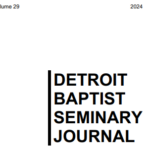Marriage Advice from a Dead Guy
A few weeks ago, I wrote a post titled “Parenting Advice from a Dead Guy.” In that post, I introduced Eastern church father John Chrysostom (c. 347–407) and noted some parenting advice found in his book An Address on Vainglory and the Right Way for Parents to Bring up Their Children.
In addition to authoring that treatise on parenting, Chrysostom was primarily a preacher, first in the city of Antioch and then in the capital city of Constantinople (modern-day Istanbul). Of the many sermons Chrysostom delivered in the late-fourth and early-fifth centuries, about 700 have survived to the present day. And in these sermons Chrysostom offered quite a bit of marriage advice. Here is just a sampling.
In a sermon on “How to Choose a Wife,” Chrysostom began by explaining the permanency and, therefore, the seriousness of marriage: “I wish to give advice to those who want to enter marriage. When we are about to buy households…we are very curious and nosy about the sellers and the previous owners…. When we are about to marry a wife, we ought to show even more foresight. If a house is defective, we can return it…. When we take a wife we cannot return her to her family, but we must keep her with us until the end” (Chrysostom, On Marriage and Family Life, p. 83).
He then continued, “I advise, therefore, and exhort those who are about to marry that they should approach the blessed Paul and read the laws that he has recorded concerning marriage… If we investigate these laws and know them well before we marry, we will take great care to choose a wife who is well-ordered from the beginning and compatible with our character” (p. 84).
A bit later in this same sermon, Chrysostom exhorted his hearers: “You must consider that marriage is not a business venture but a fellowship for life… Since we know all this, let us seek just one thing in a wife, virtue of soul and nobility of character, so that we may enjoy tranquility, so that we may luxuriate in harmony and lasting love” (pp. 89–90).
Then, at the close of this sermon, having discussed Abraham’s efforts to secure a bride for Isaac, Chrysostom drew the following application: “You fathers, imitate the foresight of Abraham, the care that he used to find an unaffected woman for Isaac’s wife. He did not look for money, for high birth, for beauty of body, or anything else but nobility of soul. You mothers, bring up your daughters as Rebecca was brought up. You bridegrooms who are about to marry girls like Rebecca, celebrate your weddings with as much decorum as Isaac did… beseech God to preside over all that is done. If we manage our families in this way… we shall enjoy great tranquility and great harmony. When we have these, the other virtues will undoubtedly follow. Just as, when a wife is at odds with her husband, nothing will be healthy in the household, even if all other affairs are flowing with the current; so when the wife is in harmony and peace with her husband, nothing will be unpleasant, even if innumerable storms arise every day” (pp. 104–5).
In a sermon on Ephesians 5:22–33, Chrysostom addressed the newly married: “Furnish your house neatly and soberly. If the bridegroom shows his wife that he takes no pleasure in worldly excess, and will not stand for it, their marriage will remain free from the evil influences that are so popular these days. Let them shun the immodest music and dancing that are currently so fashionable [in c. 400!]. I am aware that many people think me ridiculous for giving such advice; but if you listen to me, you will understand the advantages of a sober lifestyle more and more as time goes on. You will no longer laugh at me, but will laugh instead at the way people live now like silly children or drunken men. What is our duty, then? Remove from your lives shameful, immodest, and Satanic music, and don’t associate with people who enjoy such profligate entertainment” (On Marriage and Family Life, p. 54).
Concerning the tensions that inevitably arise in marriage, Chrysostom advised young husbands: “Whenever you give your wife advice, always begin by telling her how much you love her. Nothing will persuade her so well to admit the wisdom of your words as assurance that you are speaking to her with sincere affection. Tell her…that you love her more than gold; and indeed an intelligent, discreet, and pious young woman is worth more than all the money in the world. Tell her that you love her more than your own life, because this present life is nothing, and that your only hope is that the two of you pass through this life in such a way that in the world to come you will be united in perfect love” (pp. 54–55).
Closely related to this, Chrysostom counseled, “Show her that you value her company and prefer being at home to being out. Esteem her in the presence of your friends and children. Praise and show admiration for her good acts; and if she ever does anything foolish, advise her patiently. Pray at home and go to church; when you come back home, let each ask the other the meaning of the readings and the prayers… Remind one another that nothing in life is to be feared, except offending God. If your marriage is like this, your perfection will rival the holiest of monks” (p. 55).
Although imperfect and at times reflective of his culture, Chrysostom’s advice on marriage reminds us that marriage is permanent and, therefore, it must be entered with great care and sustained by mutual love and respect.



